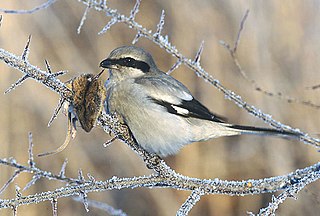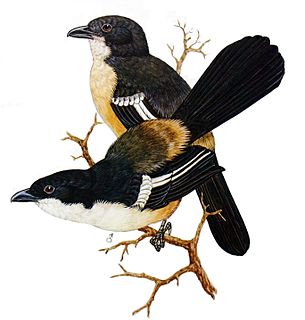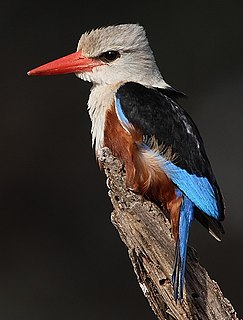
The great grey shrike is a large songbird species in the shrike family (Laniidae). It forms a superspecies with its parapatric southern relatives, the Iberian grey shrike, the Chinese grey shrike and the American loggerhead shrike. Males and females are similar in plumage, pearly grey above with a black eye-mask and white underparts.

The lesser grey shrike is a member of the shrike family Laniidae. It breeds in South and Central Europe and western Asia in the summer and migrates to winter quarters in southern Africa in the early autumn, returning in spring. It is a scarce vagrant to western Europe, including Great Britain, usually as a spring or autumn erratic.

The masked shrike is a species of bird in the shrike family, Laniidae. It breeds in southeastern Europe and at the eastern end of the Mediterranean, with a separate population in eastern Iraq and western Iran. It is migratory, wintering mainly in northeast Africa. Although it is a short-range migrant, vagrants have occurred widely elsewhere, including northern and western Europe. It is the smallest member of its genus, long-tailed and with a hooked bill. The male has mainly black upperparts, with white on its crown, forehead and supercilium and large white patches on the shoulders and wings. The throat, neck sides and underparts are white, with orange flanks and breast. The female is a duller version of the male, with brownish black upperparts and a grey or buff tone to the shoulders and underparts. The juvenile has grey-brown upperparts with a paler forehead and barring from the head to rump, barred off-white underparts and brown wings аpart from the white primary patches. The species' calls are short and grating, but the song has melodic warbler-like components.

The African paradise flycatcher is a medium-sized passerine bird. The two central tail feathers of the male are extended into streamers that commonly are more than twice as long as the body. The female tail feathers are of moderate length and without streamers. The upper parts of the male body, wings, and tail are boldly coloured in chestnut or rusty shades, but the underparts and the head are variably grey to blue-gray, with the head of the mature male being darker, commonly glossy black with greenish highlights. The beak and other bare areas, including a wattle ring round the eye, match the colour of the surrounding feathers. The female coloration is similar, though not so showy and glossy and with the head paler.

The southern boubou is a bushshrike. Though these passerine birds and their relations were once included with true shrikes in the Laniidae, they are not closely related to that family.

The eastern (pale) chanting goshawk or Somali chanting goshawk, is a bird of prey of East Africa.

The grey-headed kingfisher has a wide distribution from the Cape Verde Islands off the north-west coast of Africa to Mauritania, Senegal and Gambia, east to Ethiopia, Somalia and southern Arabia and south to South Africa.

The brubru is a species of bushshrike found in most of Sub-Saharan Africa. It is the only member of the genus Nilaus.

The tropical boubou or bell shrike is a medium-sized passerine bird of sub-Saharan Africa. This very diverse "species" with its numerous subspecies and morphs has since long posed a taxonomic problem, and recent research suggests it is a cryptic species complex that has now been split into several species.

The African cuckoo is a species of cuckoo in the family Cuculidae. It is found in Sub-Saharan Africa where it migrates within the continent, generally arriving and breeding in any one locality during the rainy season. A fairly common bird, the International Union for Conservation of Nature has rated its conservation status as being of "least concern".

The grey-headed batis is a species of bird in the wattle-eyes family, Platysteiridae, it was previously classified with the Old World flycatchers in the family Muscicapidae. It is found in eastern and central Africa.

The pygmy batis is a very small insectivorous bird which finds its food foraging among leaves, it is a member of the wattle-eyes family, the Platysteiridae. It occurs in the dry savannahs of north-eastern Africa.

The white-browed robin-chat, also known as Heuglin's robin, is a species of bird in the family Muscicapidae. Found in east, central and southern Africa, its natural habitats include riverine forest and thickets, and it is also found near humans. The IUCN classifies it as a least-concern species.

The bull-headed shrike is a passerine bird of eastern Asia belonging to the shrike family Laniidae.

The grey-backed fiscal is a species of bird in the family Laniidae. It is found in Burundi, Cameroon, Central African Republic, Chad, Democratic Republic of the Congo, Ethiopia, Kenya, Mali, Mauritania, Nigeria, Rwanda, Sudan, Tanzania, and Uganda. Its natural habitats are dry savanna and subtropical or tropical dry lowland grassland.

The Uhehe fiscal is a bird in the family Laniidae. It is endemic to the uplands of southern and eastern Tanzania. Some taxonomic authorities treat this species as a subspecies of the southern fiscal. Despite its small population size and restricted range, the International Union for Conservation of Nature has rated this species as being of "least concern".

The Somali fiscal is a species of bird in the family Laniidae. Other common names include the Karoli fiscal, the Somali fiscal shrike and the Somali shrike. The bird is found in Djibouti, Ethiopia and Somalia in the Horn of Africa, as well as in Kenya in the African Great Lakes region. Its natural habitat is subtropical or tropical dry shrubland.

The mountain shrike or grey-capped shrike, is a species of bird in the family Laniidae. It is endemic to the Philippines.

The bearded woodpecker is a species of bird in the family Picidae. It has a distinctive black and white head and brownish barred body. It is native to tropical central Africa. It has an extremely wide range and is a fairly common species, and the International Union for Conservation of Nature has rated its conservation status as being of "least concern". Some taxonomic authorities place this species in Dendropicos.

The northern fiscal is a member of the shrike family found through most of Sub-Saharan Africa. It used to be grouped with the southern fiscal. Together they were called the common fiscal.





















